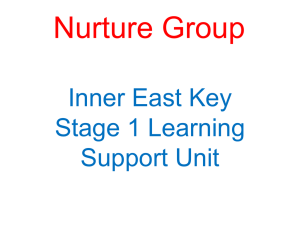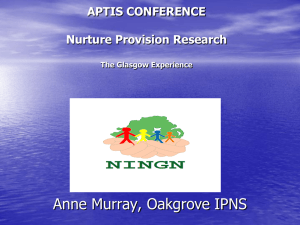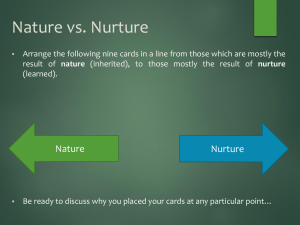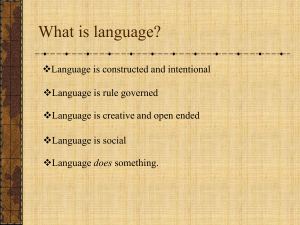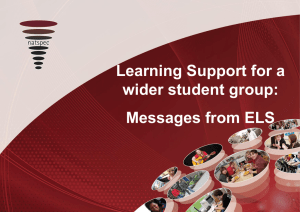The Boxall Profile & Nurture groups
advertisement
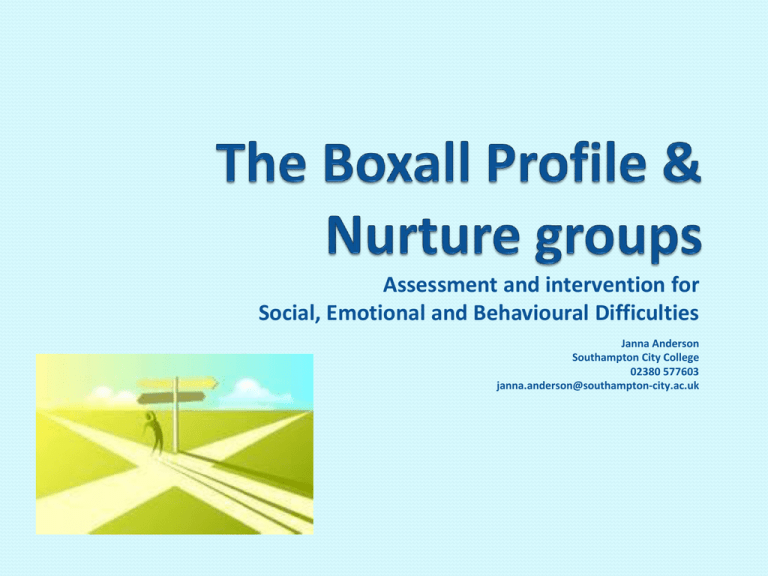
Assessment and intervention for Social, Emotional and Behavioural Difficulties Janna Anderson Southampton City College 02380 577603 janna.anderson@southampton-city.ac.uk The creation of Nurture Groups Nurture groups were developed in the 1970s by Marjorie Boxall, an Educational Psychologist. This was in response to a need in an area of London with high social deprivation. Many children were found to be unable to meet the expectations of a mainstream school environment due to the poor quality of their early social and emotional experiences. These experiences (or lack of), had the potential to present to cause attachment disorders. What are Nurture Groups? Nurture groups are small group interventions designed to equip learners with the understanding and skills to engage effectively with the education system and with others around them. A Classic Nurture Group: - learners attend for a large percentage of their weekly timetable - the group contains 8-10 learners and two adults - learners remain in the group for 2-4 terms Six principles of nurture 1. Learning is understood developmentally 2. The classroom offers a safe base 3. Nurture is important for the development of self- esteem 4. Language is understood as a vital means of communication 5. All behaviour is communication 6. Transitions are significant in the lives of children Nurture Groups in the context of Learning Support provision ‘Significantly, the nurture facility is fully embedded into the fabric of the school and sits within a flexible learning area (FLA) that offers a range of support including learning support, KS3 nurture, KS4 nurture, special unit support and specialist behaviour support. Any student may pop down to the FLA for a variety of reasons and the daily breakfast and lunchtime clubs that are open to all encourages students, staff and parents to value the nurture facility as simply one aspect of the continuum of support available at the school.’ Colley, D., 2009 Nurture groups in secondary schools Emotional and Behavioural Difficulties Vol.14 (No.4), pp.291-300 What do Nurture Groups look like in practice? D:\Nurture resources\Example of timetable 1.docx D:\Nurture resources\Example of timetable 2.docx D:\Nurture resources\Example of timetable 3.docx Curriculum Key Stage 3 & 4 National Curriclum: SEAL (Social and Emotional Aspects of Learning) Key Stage 3 & 4 National Curriclum: Citizenship SPICE (Social, Physical, Intellectual, Creative, Emotional): The Boxall Profile Functional Skills: based on levels of functional literacy and numeracy, from entry three to level two. Adult Literacy and Numeracy Curriculum: for functional literacy and numeracy from entry one to level two. What is the Boxall Profile? A diagnostic assessment tool designed to assess the specific areas of need for learners exhibiting social, emotional and behavioural difficulties. It identifies positive and negative behaviours through two questionnaires – one to assess positive behaviours and one to assess negative behaviours. It suggests an order in which to address the identified developmental needs and negative behaviours. Plans for Southampton City College The Learning Support department are leading a pilot - - project for nurture groups for learners working at level two and below. Aims: to provide a programme that is accessible to learners with social, emotional and behavioural difficulties to gauge the impact of nurture groups on retention and progression to work towards a quality mark from the nurture group network Challenges... Attainment vs. Nurture Tea and toast Logistics Nurture Group Network Information and Advice Training Quality Mark Award www.nurturegroups.org/ The relevance of nurture to our learners In addition to attachment disorders and poor quality early life experiences, many teenagers and young adults may also experience social, emotional and behavioural difficulties as a result of other factors. These may include bereavement, loss, trauma and the necessary transitions made during this period of life, from school to further/higher education and from dependence to independence. The relevance of nurture to our learners Nurture groups can provide a safe base and support for these learners as a stepping stone to independent, effective learning.

